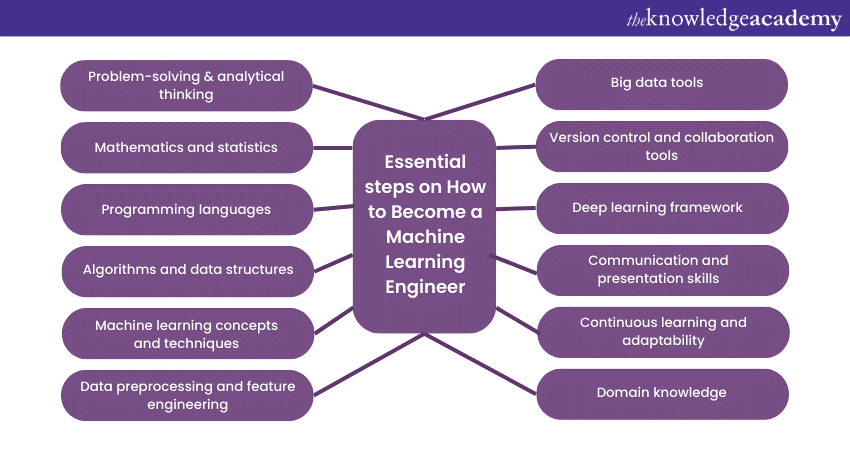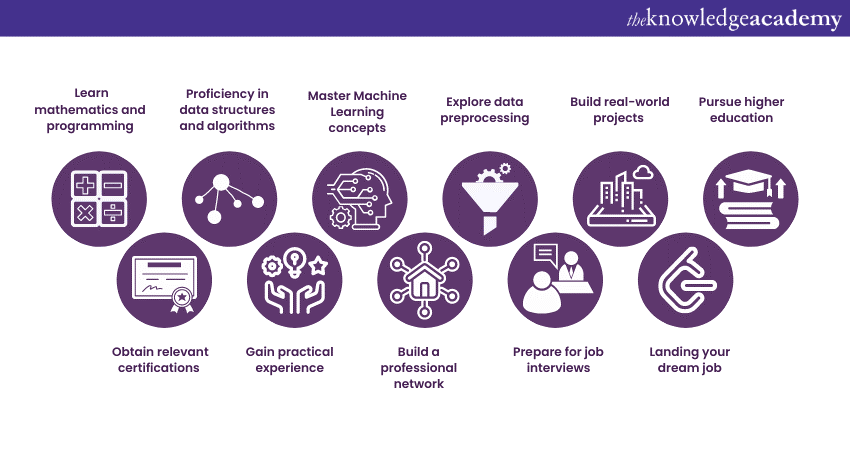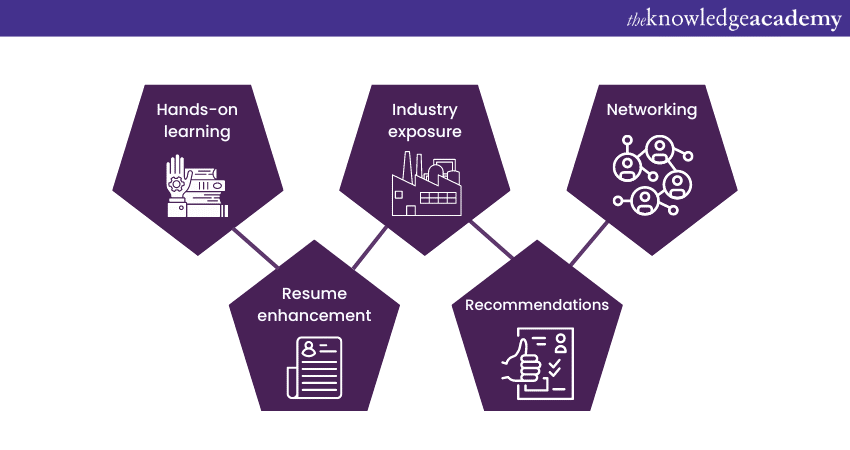We may not have the course you’re looking for. If you enquire or give us a call on +0800 780004 and speak to our training experts, we may still be able to help with your training requirements.
Training Outcomes Within Your Budget!
We ensure quality, budget-alignment, and timely delivery by our expert instructors.

As businesses harness the potential of Artificial Intelligence (AI), the need for skilled Machine Learning Engineers continues to rise. However, many individuals who aspire to pursue a career in this exciting field but don't know How to Become a Machine Learning Engineer.
According to Glassdoor, the average annual salary of a Machine Learning Engineer in the UK is about £65,925. So, becoming a Machine Learning Engineer can be extremely rewarding with lots of benefits. Want to know how? In this blog, you will learn about the essential steps of How to Become a Machine Learning Engineer, as well as learn the key skills required.
Table of Contents
1) Understanding the role of a Machine Learning Engineer
2) Developing key skills for a Machine Learning Engineer
3) Essential steps to become a Machine Learning Engineer
4) Key considerations for education and certification
5) Gaining practical experience
6) Job search strategies
7) Conclusion
Understanding the role of a Machine Learning Engineer
Before learning How to Become a Machine Learning Engineer, let’s first understand their role. A Machine Learning Engineer is a professional who is involved in designing, building, and deploying Machine Learning models that enable computer systems to perform tasks without explicit programming. They play a vital role in developing AI-driven services and products that solve complex problems and optimise processes.

Developing key skills for a Machine Learning Engineer
The first step in learning How to Become a Machine Learning Engineer is developing and honing certain key skills. These skills not only enhance your technical capabilities but also enable you to excel in problem-solving, communication, and collaboration. Let's delve into the essential skills you need to become a Machine Learning Engineer:

1) Problem-solving and analytical thinking: As a Machine Learning Engineer, you'll encounter complex challenges, and the ability to approach them with analytical thinking is paramount. You'll need to break down problems into manageable components, analyse data patterns, and devise creative solutions using Machine Learning algorithms.
2) Mathematics and statistics: Strong foundations in mathematics and statistics are fundamental to understanding the underlying principles of Machine Learning algorithms. Concepts such as algebra, calculus, probability, and statistics play a vital role in building and optimising models.
3) Programming languages: Proficiency in programming languages is a key requirement for implementing Machine Learning solutions. Python is the most widely used language in the field due to its extensive libraries and ease of use. R and Java are also valuable languages to be familiar with.
4) Algorithms and data structures: Knowledge of data structures and algorithms is essential for efficient data processing and model optimisation. Understanding concepts like sorting, searching, and graph algorithms can greatly impact the performance of your Machine Learning models.
5) Machine Learning concepts and techniques: Mastering the core concepts and Techniques of Machine Learning is at the heart of your role as a Machine Learning Engineer. This includes supervised and unsupervised learning, reinforcement learning, and natural language processing, among others.
6) Data preprocessing and feature engineering: In real-world scenarios, data is very rarely clean and ready for analysis. Learning how to preprocess and engineer features from raw data is critical to ensure the accuracy and effectiveness of your Machine Learning models.
7) Big data tools: As datasets continue to grow in size and complexity, working with big data tools becomes essential. Familiarise yourself with technologies like, Apache Hadoop and Spark, which can handle large-scale data processing.
8) Version control and collaboration tools: Machine Learning Engineers often work in collaborative teams, so proficiency in version control systems like Git is valuable for managing codebase changes. Additionally, using collaboration tools like Jupyter Notebook facilitates sharing and documenting your work.
9) Deep Learning frameworks: Familiarity with Deep Learning frameworks like TensorFlow and PyTorch allows you to work on advanced projects involving neural networks and deep learning models.
10) Communication and presentation skills: Effectively communicating your findings and insights to non-technical stakeholders is crucial. Develop the ability to explain complex Machine Learning concepts in a clear and concise manner.
11) Continuous learning and adaptability: The field of Machine Learning evolves rapidly, with new algorithms and approaches emerging frequently. Stay up-to-date with the latest advancements through continuous learning and be adaptable to change.
12) Domain knowledge: Gaining domain knowledge in the industries you work with can help you tailor Machine Learning solutions that align with specific business needs and objectives.
Step into the AI Revolution and elevate your skills with our Machine Learning Training – Sign up now!
Essential steps to become a Machine Learning Engineer
The journey of Learning How to Become a Machine Learning Engineer is amazing and thrilling. It requires dedication and a strategic approach. If you're passionate about Artificial Intelligence, here are the steps on How to Become a Machine Learning Engineer:

1) Work on real-world projects: Theory is essential, but hands-on experience is invaluable. Engage in personal projects or participate in open-source projects to gain practical experience and demonstrate your skills to potential employers. Building a strong portfolio is a great way to showcase your capabilities.
2) Develop key skills for a Machine Learning Engineer: Beyond technical knowledge, certain skills are essential for success in this field. Enhance your problem-solving, analytical thinking, communication, and collaboration skills to improve as a Machine Learning Engineer.
3) Pursue higher education in Machine Learning or related fields: While a formal degree is not always required, pursuing higher education in Machine Learning, Artificial Intelligence, or Data Science can provide you with a comprehensive understanding and a competitive edge in the job market.
4) Obtain relevant certifications: Industry-recognised certifications from reputable platforms can further validate your expertise and make your resume stand out to potential employers.
5) Gaining practical experience: Participating in internships or boot camps offers practical experience and exposure to real-world Machine Learning projects. This hands-on experience is invaluable for your professional growth.
6) Build a professional network: Networking is crucial for expanding your career opportunities. Attend conferences, seminars, and meetups related to Machine Learning to connect with industry professionals, potential mentors, and employers.
7) Prepare for job interviews: To secure a Machine Learning Engineering position, prepare for technical interviews that assess your problem-solving skills, algorithmic knowledge, and understanding of Machine Learning concepts.
8) Job search strategies: Craft a well-structured resume and compelling cover letter that highlight your Machine Learning projects and experiences. Utilise online job platforms, company websites, and networking platforms to explore and apply for job opportunities.
Transform Data with AI with our AI And ML With Excel Training – Sign up today!
Key considerations for education and certification
Education and certification are vital in shaping the career of a Machine Learning Engineer. While there are various paths to enter the field, acquiring the right education and obtaining relevant certifications can significantly boost your credibility and expertise. Here are some key considerations for education and certification in becoming a successful Machine Learning Engineer:
1) Pursue higher education in Machine Learning or related fields: Pursue a formal degree in Machine Learning, Artificial Intelligence, Data Science, Computer Science, or a related field. It can provide you with a detailed knowledge of the practical and theoretical sides of Machine Learning.
2) Online courses and specialisations: If pursuing a full-time degree is not feasible, consider online courses and specialisations offered by reputable platforms. These platforms offer flexible learning options that allow you to acquire specific skills and knowledge in Machine Learning at your own pace.
3) Machine Learning boot camps: For individuals looking for an immersive and hands-on learning experience, Machine Learning boot camps can be a great option. These intensive programs focus on practical applications and projects, giving you a real-world understanding of Machine Learning concepts.
4) Obtain relevant certifications: Industry-recognised certifications add value to your resume and demonstrate your commitment to continuous learning. Seek certifications from platforms that are well-regarded in the industry and offer comprehensive assessments of your skills and expertise.
5) Specialised courses on deep learning and neural networks: As deep learning plays a crucial role in modern Machine Learning applications, consider taking specialised courses that delve into neural networks, convolutional neural networks (CNNs), recurrent neural networks (RNNs), and other deep learning architectures.
6) Participate in online competitions: There are many platforms that host Machine Learning competitions. Participating in these competitions allows you to apply your knowledge and compete with Data Scientists and Machine Learning enthusiasts from around the world. It's a great way to showcase your skills and gain recognition in the community.
7) Stay updated with research papers and publications: The field of Machine Learning is consistently evolving with new research and breakthroughs. Stay informed by regularly reading research papers, attending conferences, and following leading researchers in the field.
8) Create and contribute to open-source projects: Engaging in open-source projects not only helps you gain practical experience but also allows you to collaborate with other developers and contribute to the Machine Learning community.
Gaining practical experience
Gaining practical experience is crucial while learning How to Become a Machine Learning Engineer. It helps reinforce their theoretical knowledge and develop real-world skills. Two effective ways to gain hands-on experience are through internships and Machine Learning boot camps. Let's explore both options:
Internships
Internships provide valuable opportunities to work in a professional setting and apply Machine Learning concepts to real-world projects. Here's how internships can benefit you as a budding Machine Learning Engineer:

1) Hands-on learning: Internships offer practical experience in data preprocessing, model development, and evaluation. You'll gain insights into how Machine Learning is used to solve actual business problems.
2) Industry exposure: Working in a company exposes you to various industries and domains, such as healthcare, finance, e-commerce, or autonomous vehicles. This exposure helps you understand specific challenges and requirements in different sectors.
3) Networking: Internships allow you to build a professional network, connecting you with mentors, experienced engineers, and potential employers.
4) Resume enhancement: Having internships on your resume showcases your ability to work on real-world projects, making you more appealing to future employers.
5) Recommendations: Positive feedback and recommendations from supervisors during internships can strengthen your job applications. It can increase your chances of landing full-time positions.
Machine Learning boot camps
Machine Learning boot camps are intensive and focused programs designed to provide practical, hands-on experience in a short period. Here are the advantages of enrolling in a Machine Learning boot camp:
1) Immersive learning: Bootcamps offer a condensed and immersive learning experience, allowing you to focus solely on Machine Learning for an extended period.
2) Practical projects: Bootcamps often involve real-world projects and case studies, enabling you to build a portfolio showcasing your abilities.
3) Expert guidance: Experienced instructors and mentors guide you through the boot camp, helping you grasp complex concepts and techniques efficiently.
4) Peer collaboration: Bootcamps foster a collaborative environment, encouraging you to work with fellow learners and share knowledge and ideas.
5) Fast-track career entry: Bootcamps can fast-track your entry into the job market, as they equip you with the skills required by industry employers.
Gaining practical experience is a pivotal step in becoming a proficient Machine Learning Engineer. The hands-on exposure gained from real-world projects enhances your problem-solving skills and strengthens your portfolio. It also makes you better equipped to tackle the challenges of the rapidly advancing field of Machine Learning.
Job search strategies
Landing your dream job as an Engineer in Machine Learning requires a strategic and proactive job search approach. Here are some effective job search strategies to help you secure your ideal position in the field:
1) Tailor your resume and cover letter: Optimise your cover letter and resume for each application to highlight your relevant skills and experiences. Focus on showcasing your Machine Learning projects, technical expertise, and accomplishments. Tailoring your application materials demonstrates your genuine interest in the specific role and helps you stand out to potential employers.
2) Utilise online job platforms: Explore popular online job platforms such as LinkedIn, Indeed, Glassdoor, and Monster for Machine Learning Engineer job openings. Use relevant keywords and filters to filter your search and find opportunities that align with your interests and qualifications.
3) Company websites and career pages: Visit the career pages of companies that interest you to explore their job listings directly. Many companies post openings on their websites before they appear on external job platforms. Researching and applying to positions on company websites can give you an advantage in the application process.
4) Networking and professional events: Networking is a powerful tool for job seekers. Attend Machine Learning conferences, seminars, and meetups to connect with industry professionals, potential mentors, and employers. Engaging with the Machine Learning community can lead to valuable connections and potential job opportunities.
5) Leverage LinkedIn: Create a strong LinkedIn profile that highlights your Machine Learning skills, projects, and achievements. Connect with professionals in the field and join relevant Machine Learning groups to expand your network. Engaging with industry experts and sharing your insights can increase your visibility to potential employers.
6) Reach out to recruiters: Many companies work with recruiters to fill their Machine Learning Engineer positions. Reach out to recruiters who specialise in tech or AI-related roles and share your career goals and interests. Building relationships with recruiters can lead to job opportunities tailored to your skills and preferences.
7) Attend career fairs: Look for career fairs or job fairs that focus on technology or Data Science fields. These events provide opportunities to meet professionals from numerous companies and discuss potential job openings. Be prepared to showcase your skills and experiences during these interactions.
8) Personal projects and portfolio: Keep building and showcasing personal Machine Learning projects on platforms like GitHub or Kaggle. A strong portfolio with diverse projects demonstrates your passion for the field and your ability to apply your knowledge to real-world challenges.
9) Referrals and recommendations: Leverage your network for referrals and recommendations. If you have connections within companies you're interested in, ask if they can refer you for any open positions. Recommendations from people who have worked with you can also carry significant weight during the hiring process.
Remember that the job search process may take time and effort. But, with perseverance and a proactive approach, you'll find the right opportunity to kick-start your fulfilling career in Machine Learning.
Unleash the power of Deep Learning and propel Your AI journey with our Deep Learning Training – Sign up today!
Conclusion
We hope you read and understand How to Become a Machine Learning Engineer. It requires a strong foundation in math and programming, practical experience, and continuous learning. So, tailor your job search, network, and stay persistent to land your dream job in this exciting field.
Embrace the Power of Machine Learning Today with our comprehensive Artificial Intelligence & Machine Learning – Sign up now!
Frequently Asked Questions
Upcoming Data, Analytics & AI Resources Batches & Dates
Date
 Introduction to AI Course
Introduction to AI Course
Fri 24th Jan 2025
Fri 28th Mar 2025
Fri 23rd May 2025
Fri 25th Jul 2025
Fri 26th Sep 2025
Fri 28th Nov 2025







 Top Rated Course
Top Rated Course


 If you wish to make any changes to your course, please
If you wish to make any changes to your course, please


